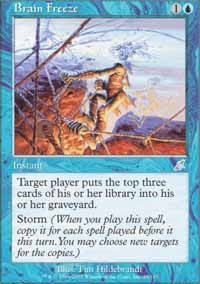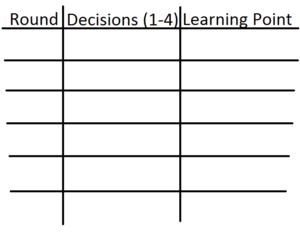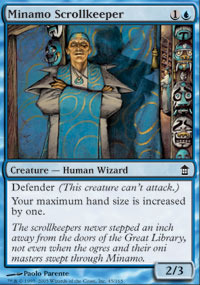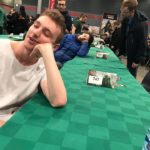The Mental Game of Magic the Gathering – Variance

It’s possible to do everything correctly in a game of Magic and still lose. This is a big reason why the game can be frustrating to many players. This is also the reason that keeps me interested, this game is fascinating!
The mental aspects of Magic are vital to becoming a better player. Exploring deck lists and playing lots of matches is a sure fire way of preparing for an upcoming tournament. This is valuable in the short term because it has an immediate impact on your win percentage at that tournament. However I believe that in the long term the mental aspects of Magic are equally, if not even more important, than these things. Topics such as: focus, motivation, tilt and improving are all incredibly important when it comes to Magic. Most players don’t even know that they should be thinking about these things.
The first thing to understand is that the mental game should be treated just like the physical game. It is a slow and steady process. You may not see results in the next few days or weeks. It is something that needs to be worked at constantly.
Long term gain: The mental aspects of Magic require effort and can be learned just like any other skill.

Would magic be the same if the best player always won? The short answer is no, we would be playing a totally different game, probably something closer to chess. Magic is similar to Poker in that any player can win a match but a better player has a much higher chance of winning. This is the reason the game works and is the reason that keeps people coming back because it makes the game interesting. You can play the same deck one hundred times and it will still be interesting as different and random things occur in each game. People often refer to this as variance.
Long term gain: Magic works and is interesting because of variance.
I eluded to the fact that many players get frustrated when playing Magic or when variance doesn’t go their way. This can lead to tilt problems. Tilt is a term from poker. It describes a person that has to some extent lost control of their emotions and can no longer make objective optimal decisions. Tilt is an incredibly deep topic and one I look forward to exploring a lot more. But before we can look at tilt, we have to be able to comprehend variance. A lot of competitive players that I speak to understand that variance is required for the game to function. However they still find themselves often getting frustrated or tilted after a match. Also note that tilt doesn’t always manifest itself outwardly as frustration, it can affect your ability to play Magic in many ways.

Awareness is key in understanding variance. We have already talked about why variance is necessary in Magic, now we have to actually quantify it. How much does variance affect our games? It’s a really hard question to answer. Begin by gathering data from your own matches. I think a really good way of doing this is to just draw a table in the back of your life pad or keep track on your phone. It can be really simple, here’s an example:

There are a few interesting things going on in this simple table. The inverse of variance is your control over a game. Every decision you make is essentially a potential spot to make a mistake. It’s more constructive for us to look at our own decisions and it also goes hand in hand with variance. After each game try ranking yourself from 1-4, not on how well you made decisions, but on how much of an impact you think your decisions had on the match. You’ll notice you can’t choose zero because your decisions will almost always have some effect on your games. The scale is set at 1-4 because there is no middle ground, you can’t choose 2.5. Lastly, always try and write down one thing you could have done differently in your match ‘Learning Point’, there’s always something.
Long term gain: Make a habit of recording your variance

There are some great ways you can estimate how much of a toll variance took on your game and conversely how much you impacted the game. Try counting the number of lands you’ve drawn (and started the game with) and compare against the number of lands your opponent drew. This is particularly great in Limited because the power level of spells is usually quite close. This means that just having more spells is usually an advantage. For example in one game I started by keeping 4 lands, when the game ended I had 24 cards left in my library and I had 6 lands in play and 1 in my hand. I started with 7 cards and saw an additional 9 cards, from these 9 I drew 3 lands. This is pretty good and above what you might expect. My opponent went through 13 cards and found 9 lands, this was definitely a big factor in the outcome of our game.
Another example would be the number of potential draws or outs you have in a given scenario. Recently I was playing a really close match as Affinity against Lantern Control in Modern. My opponent had Ensnaring Bridge in play and multiple Codex Shredders but no Lantern of Insight. I had a lonely Signal Pest and some non-creature artifacts that were not Cranial Plating. The game went on for about 15 turns in this board stall and my opponent eventually used academy ruins to buy back Lantern of Insight and I was immediately locked out of the game. Many people would leave this game thinking that they had many outs (which is true) and that their opponent received more luck than they did.
Let’s take a closer look at this situation. Ignoring combinations of cards I can draw, the single cards which will put me ahead in this board stall are: Cranial Plating, Ornithopter, Memnite, Signal Pest, Arcbound Ravager. This totals 17 cards left in my deck, when the board stall began I had 46 cards in my library. That’s about a 37% chance to gain an advantage in this game and the odds get better with each draw step. However the truth is that drawing an Ornithopter or Memnite would give me an advantage but would still be incredibly slow. I didn’t have enough artifacts in play to make Ravager a lethal draw and it only really has one use in this situation. due to the Ensnaring Bridge. Drawing a Signal Pest would be good and would make further 0 drops good draws.
So my only great draw was Cranial Plating, which of course lowers my percentage to win by a lot. Whereas my opponent had Academy Ruins and 2 Codex Shredders in play, meaning that they get to mill 3 cards a turn digging for Lantern plus their draw step. Comparing yourself to your opponent in terms of variance is really helpful. This may sound odd because for most players thinking about why they lost leads to tilt. But this is vital in beginning to understand how to deal with these problems. Try to have an objective view when doing this. Focus on justifying to yourself how randomness affected your matches.
Long term gain: Objectively compare your variance to your opponent
If you care about improving your game, try and do something today that will help you in the long run. My focus has always been on playing to learn, the wins will come as a by-product of improving. You can’t change variance but you can change how it affects you. Take control.
Thanks for reading. If you have any questions please post in the comments below.





